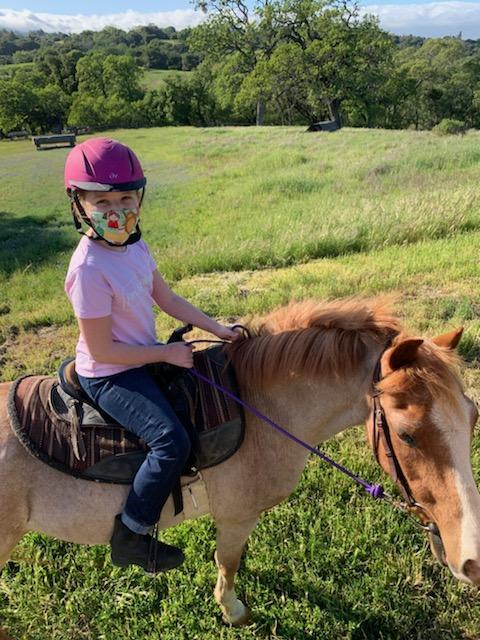
Standing Ovation: Radical Inclusivity at B.O.K. Ranch
Horse Nation is bringing back the Standing Ovation column — a column dedicated to recognizing those doing good in the horse world. This week’s standing ovation goes to B.O.K. Ranch and their approach to inclusive lessons.
Set in the hills of Woodside, California, not far from the Stanford stables of Palo Alto, B.O.K. Ranch is doing something radical. The interesting part of that radical-ness is how plain simple it is: this riding center doesn’t segregate based on levels of ability.
B.O.K. offers lessons to neurotypical individuals and persons with physical and developmental diagnoses. The bold contrast between B.O.K. and other lesson barns and therapeutic riding programs is that in their arena those kids take the lessons together. The ranch’s equine activities showcase “community-based full inclusion programming” and aim to foster interdependence among the students regardless of diagnoses.

Students in B.O.K.’s full inclusivity programs lesson together during the pandemic. Photo courtesy of Tish Dipman.
“Equity is at the base of our program,” explained Tish Dipman, Executive Director for B.O.K. “It’s pretty simple. We aim to meet each rider where they are at. Each group lesson has a goal, and everyone works on that goal in the way they can. If the goal is a 20-meter circle, some will be cantering, some will be trotting with a spotter, and some might be walking with a full team of side walkers.”

At B.O.K. the goal is to “meet students where they are” for each lesson. Photo courtesy of Tish Dipman.
Dipman, who has been part of the B.O.K. team for 18 years, went on to explain that training students in their own segregated classes based on diagnosis felt a bit like labeling which water fountain they should drink from. So, B.O.K. simply stopped making them separate.
B.O.K. Ranch has always existed on the cutting edge — with an inclusivity twist. Thirty-six years ago, the ranch opened as a therapeutic riding program, when simply doing that put them on the frontier of using hippotherapy to work with physical and developmental disabilities. Over time, their summer camps provided a model for their full-inclusion programming. Once the unsegregated camps closed for the season, the parents and students wondered if participants with and without diagnoses could continue to train simultaneously. B.O.K. did just that, and a decade ago, they crafted their current model of fostering independence through interdependent training.
Today, it is not abnormal to see students using sign language to communicate across the arena, or for siblings to lesson together. For families where one sibling has a diagnosis, this can be game-changing. Riding is one of the few sports that can be practiced together, even if physical or developmental ability levels differ. “Horses are a great equalizer,” Dipman went on to explain. “You’re going to be just as terrible as the other kid who also does not know how to stop and steer. Regardless of diagnosis, horses make you equally as good or as bad as someone on the same level.”
Dipman went on to provide a clear example:
We had a child in our program for about two years when the program decided to become a full-inclusion program. At that time, the Mom decided to enroll his neurotypical sister in the class with him. In the beginning we weren’t sure if he would appreciate her being there or if he was going to feel like she was intruding on his special horse time. Within about two weeks, he would wake up in the morning rush downstairs (before school) and get his sisters helmet out and give it to her, with glee, very excited. He wanted to be sure she was ready to go (about eight hours early). It was then that we knew we were on to something and the program has grown a lot since then.
While Tish’s story references a time before the pandemic, B.O.K. Ranch’s growth has continued to through the current era. COVID-19 has encouraged parents to target ‘outside sports’ for their children. With a natural six-foot barrier of a horse length, the desire for riding lessons have increased markedly, leading to a waitlist that Dipman describes as “unprecedented.” In addition to basic instruction, with the help of the surrounding community and local charities, the ranch also provides programming that facilitates equine access for local children in foster care and of-color youth.

A student pilots Shady, the pony, during a pandemic-time lesson at B.O.K. Photo courtesy of Tish Dipman.
Each of these programs speaks to B.O.K.’s cornerstone value of inclusivity through horses. Dipman put it plainly, “No matter who you are, if horses are our common interest, our similarities outweigh our differences.” The concept is so simple that it is simply radical.
For more info on B.O.K. Ranch, visit their website here: http://www.bokranch.org
Here at Horse Nation we love to recognize individuals and organizations that are doing good work in the horse world. If you know someone who deserves a Standing Ovation, we would love to recognize them in a future post. Email the name of the person or organization along with a message about the good work they do to [email protected]. Photos/videos are always welcome, and include a link to their website if applicable.







